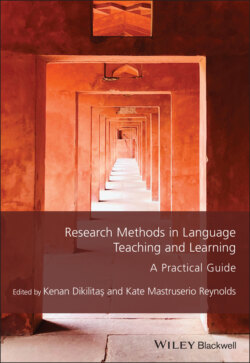Читать книгу Research Methods in Language Teaching and Learning - Группа авторов - Страница 46
Overview
ОглавлениеStudying at an English language teaching (ELT) department at a university changed my conceptualization of what language knowledge was. Before university, I believed that I was competent in English because I was successful in my English classes. However, at university I realized that there was much more involved when I was required to study courses that focused on different language skills (i.e., listening, speaking, and writing). Previously my English studies had been limited to reading comprehension and recognizing vocabulary and grammar. In fact, despite my success in English lessons and achievement in the university entrance examination, I could not really claim to be competent in English at all. After two decades, this is still a typical situation in the Turkish educational system: learners of English as a foreign language (EFL) cannot use English communicatively even though they exert considerable effort in their studies and perform well in central examinations. For that reason, teaching English is considered to be a perennial problem in Turkey (Kırkgöz, 2008; Uysal, 2012). However, this is not unique to the Turkish context; it is reported in the literature that ELT in many monolingual regions and countries, such as East Asia (Williams, 2017), China (Lei & Qin, 2009; Pan & Block, 2011), Japan (Gorsuch, 2000), Pakistan (Ali et al., 2009) and Libya (Aloreibi & Carey, 2017) fails to improve learners’ communication skills. Therefore, improving learners’ abilities to use English communicatively seems to be one of the major challenges of EFL teaching in many monolingual contexts. This problem became my main research topic, which I investigated in Uztosun (2013) in my PhD dissertation. As a matter of fact, most of my research work focused on studies that addressed speaking English, as speaking is one of the most essential communication skills and, hence, a significant aspect of language learning (Grainger, 2000; Hall & Austin, 2004; Nunan, 1991).
In selecting a research topic for my Doctorate in Education (EdD) dissertation, my main concern was to conduct a research study that could generate practical implications to improve the effectiveness of EFL speaking classes. These concerns made it essential to develop a hypothesis based on the data collected throughout the research. To do so, I needed to collect rich data and make a thorough analysis on the possible relationships between codes and categories that emerged from data in different phases of my research. I therefore followed grounded theory: it is an effective way to develop theory based on the data gathered and analyzed systematically (Strauss & Corbin, 1998). In so doing, grounded theory enabled me to follow a systematic procedure to collect and analyze data, which led to offering possible solutions to problems that may be experienced in EFL speaking classes.
In essence, there is agreement in the literature about the characteristics of effective speaking classes: students should be active (Littlewood, 1992), highly engaged (Hall & Austin, 2004), and have ample opportunities for talking (Ur, 1996). These are particularly important in speaking classes because the effectiveness of a speaking activity depends on the extent to which it fosters students’ participation. To do so, it is suggested that learning must be relevant to learners’ interests and needs (Littlewood, 1992); and lesson content should be flexible in order to encourage student participation (Johnson, 1995). However, since speaking a foreign language is an anxiety-producing experience (Young, 1990), increasing student participation is challenging because anxious students tend to avoid speaking English.
In seeking possible ways to design effective speaking classes, I learned the term “student negotiation,” which means learner participation in making instructional decisions such as content selection and assessment (Clarke, 1991). Student negotiation means engaging in a dialogue with pupils to identify their interests and understand their views of the learning situation (Doran & Cameron, 1995); it can help in the design of effective speaking classes as it allows for the involvement of students in the decision-making process for the course content. Despite the possible positive outcomes of student-negotiated classes, there were few research studies on student negotiation, and, to the best of my knowledge, no study had investigated student negotiation in the EFL field with particular attention to EFL speaking classes. For that reason, there were no relevant theories to address when making assumptions regarding possible outcomes of student-negotiated speaking classes. This was one of the reasons why grounded theory was implemented in this research, in that grounded theory is useful in contexts where little is known about a particular topic (Holloway & Wheeler, 2002). This study therefore did not rely on an existing theory but aimed to develop a theoretical hypothesis on an under-researched area – the implementation of student-negotiated speaking classes in an EFL setting.
